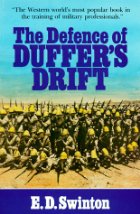Mar.16.2009
by Ed Beakley
1. The Defense of Duffer's Drift
 The Defence of Duffer’s Drift was written by Major General Sir Ernest Dunlop Swinton in the April 1905 edition of the Journal of the United States Infantry Association. At the time, he was a Captain, shortly after his service in the Boer War, using the pseudonym, Lieutenant Backsight Forethought. This book has become a military classic on minor tactics.
The Defence of Duffer’s Drift was written by Major General Sir Ernest Dunlop Swinton in the April 1905 edition of the Journal of the United States Infantry Association. At the time, he was a Captain, shortly after his service in the Boer War, using the pseudonym, Lieutenant Backsight Forethought. This book has become a military classic on minor tactics.
This book still has much to teach others, as a literary fiction. The following is a quote from the Winter 2005 edition of the Canadian Army Journal (volume 8.1, pp 93-94):
The South African War (1899-1902) provided the next opportunity for literary fiction to play a role in future army concepts. The publication of The Defence of Duffer’s Drift by Captain (later Major-General Sir) Ernest Swinton, KBE, CB, DSO, in 1905, was extremely well received and became required reading for many subsequent generations of young officers. Set at a river choke point on some generic veldt anywhere in the Transvaal, the story’s main character, a young and energetic Lieutenant Backsight Forethought, has a series of nightmares in which he loses battle after battle against his Boer adversaries. After each dream, however, a series of lessons are highlighted, and each of these was incorporated into the next battle, which eventually leads Lieutenant Forethought to victory and relief in the final dream. Although written as a fictional tale, Swinton’s aim was to teach tactical lessons as well as generate discussion and debate on the planning and execution of operations.
What would you do?
Lieutenant Backsight Forethought (BF to his friends) has been left in command of a 50 man reinforced platoon to hold Duffer’s Drift, the only ford on the Silliasvogel River available to wheeled traffic. Here is his chance for fame and glory. He has passed his officers courses and special qualifications.
“Now if they had given me a job,” says BF, “like fighting the Battle of Waterloo, I knew all about that, as I had crammed it up…”
While BF’s task appears simple enough, the Boer enemy causes a multitude of problems, but you, smart reader, with a quick mind and sharp intellect will, no doubt, solve the problem before the first shot is fired.
| PREFACE: |
“It was our own fault, and our very grave fault, and now we must turn it to use. We have forty million reasons for failure, but not a single excuse.” KIPLING.
This tale of a dream is dedicated to the “gilded Popinjays” and “hired assassins” of the British nation, especially those who are now knocking at the door, to wit the very junior. It embodies some recollections of things actually done and undone in South Africa, 1899-1902. It is hoped that its fantastic guise may really help to emphasize the necessity for the practical application of some very old principles, and assist to an appreciation of what may happen when they are not applied, even on small operations. This practical application has often been lost sight of in the stress of the moment, with dire results, quite unrealized until the horrible instant of actual experience.
Should this tale, by arousing the imagination, assist to prevent in the future even one such case of disregard of principles, it will not have been written in vain. The dreams are not anticipations, but merely a record of petty experiences against one kind of enemy in one kind of country only, with certain deductions based thereupon. But from these, given the conditions, it is not difficult to deduce the variations suitable for other countries, or for those occasions when a different foe with different methods of fighting and different weapons has to be met.
| PROLOGUE: |
Upon an evening after a long and tiring trek, I arrived at Dreamdorp. The local atmosphere, combined with a heavy meal, is responsible for the following nightmare, consisting of a series of dreams. To make the sequence of the whole intelligible, it is necessary to explain that though the scene of each vision was the same, by some curious mental process I had no recollection of the place whatsoever. In each dream the locality was totally new to me, and I had an entirely fresh detachment. Thus, I had not the great advantage of working over familiar ground. One thing, and one only, was carried on from dream to dream, and that was the vivid recollection of the general lessons previously learnt. These finally produced success.
The whole series of dreams, however, remained in my memory as a connected whole when I awoke.
Backsight Forethought
What would you do?
